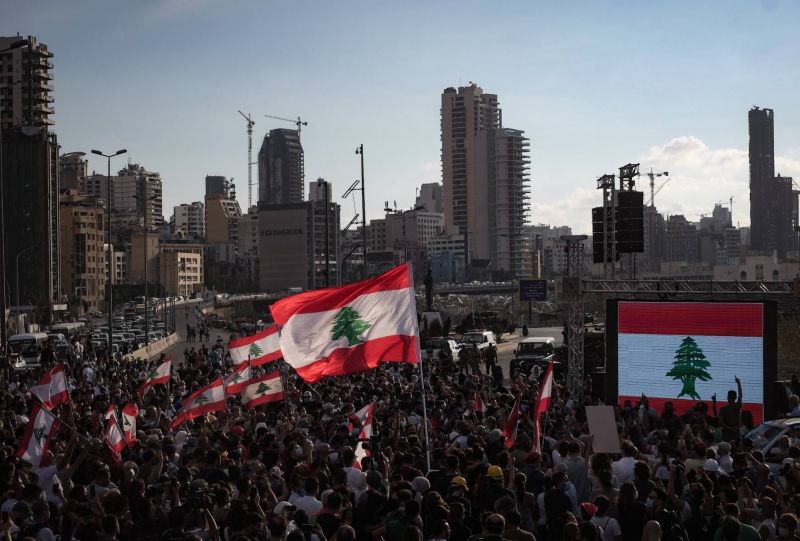
Scene from a protest just days after the Beirut port explosion. Aug. 8, 2020. (Credit: Joao Sousa/L'Orient Today)
Perhaps there is little to celebrate in a modern failed state, born out of a 19th-century Ottoman Mutassarifeye turned 20th-century French mandate. But eight decades to the day after France ordered its retreat, we find ourselves suffering through recent history.
The bitter consequence of lost agency. That essential ability to shape destiny — in our case cast aside in favor of turning into a preferred battlefield — succumbing to geopolitical rift and strife.
The advantage for external players and the curse of where we are. Not who we are. Making us lose sight of a rich and layered past and that shaped our loose-knit identity.
Of diversity among denominations that held their safeguards. And a breathing space guaranteeing this country’s once-heralded tolerance and embrace.
Pluralism, in its most positive light. With no majority that can impose its will and minorities that feel at ease (despite shifting demographics) and most importantly, at home. Respect for cultural divergence, nationalities and languages. At its best, a refuge that sheltered the Middle East’s most vulnerable and championed its freest of minds, turning Beirut into the region’s metropole of defiant charm and world-renowned cosmopolitanism.
When a pejorative, sectarianism comes to mind – a fracturing politics along fault lines where diversity yields to division and corruption, and quotas do less to ensure communal harmony and more to destroy meritocracy. Institutional failure becoming standard. Those seeking better fortunes flee and local fortunes and finance run dry.
And a Lebanon that no longer thrives.
Empires and countries, cultures and great cities can both rise and fall. Our short-lived experiment had its rollercoaster ride of prosperity turned to tragedy.
Those two decades that saw a fledgling post-1943 state rise, overlapped with a wider Arab nationalism clashing with a narrower Lebanese persuasion. A three-month civil war in 1958, ending only after American marines landed and a military commander, Fouad Chehab, was brought to Baabda.
We were lucky that Chehab was a statesman. Yes, his deuxième bureau was an abusive intelligence instrument and he ran afoul of older established political families. Yet most institutions we depend on — now in need of massive overhaul — date back to his presidency.
His tenure mattered. A template was delivered, neither friendly nor antagonistic to Egypt’s pan-Arabism — rather, an acceptance of Gamal Abdel Nasser’s popularity while meeting him not in Beirut but on the United Arab Republic border. And that measure of neutrality, desperately needed, was only tested in the 1960s.
In that decade of regional turmoil, our banking sector flourished. Our tourism economy expanded. In June 1967 Israel annexed Syria’s Golan Heights, occupied Jordanian-run West Bank and Egyptian-administered Gaza Strip and took military control over the Sinai Peninsula.
That war was fought along all Israeli fronts. With one exception: Lebanon. Not one shot was fired across either side of the border. What should have dragged us into war spared us that round of fighting.
And for a brief moment, Lebanon’s sovereignty survived.
That all ended, of course, two years later in 1969, when the Cairo Agreement ensured an open southern "Fatahland" front against Israel. One year later, Jordan expelled the PLO to Beirut, rendering the Lebanese army helpless and its monopoly of force tossed away overnight. Militia begetting militia, and the challenge to Fatah tearing Lebanon apart in 1975.
A status quo of paramilitary dominion over state authority.
Half a century later, as we watch ongoing carnage in Gaza, we are not only sympathizing with a century of Palestinian suffering and plight. We are collectively on standby, watching Hezbollah’s every move and rushing home when Hassan Nasrallah delivers words determining peace and war.
A defense strategy tied to Iran’s leverage in the region. With little independence left to celebrate.
No president or central bank governor, and, soon enough, a departing army commander. A caretaker prime minister and an absent cabinet, a parliament speaker refusing to hold sessions with members of parliament with less influence than social media influencers. Aspirations demanded from the street, shelved, with little to no reform in sight.
The older generation that knew our better days is fading away. The rest of us grew up in civil war, occupation and sub-state paralysis. Younger activists are less eager to hold on to what first brought Lebanese together — that consensus, consociation and compromise that allowed individuals and communities to express themselves naturally.
Despite the centuries it took to find a governance that works, our older and more inefficient ways may well be unfit for the 21st century. If we demand something different in the end, we should accept that redefining challenge.
But before then, the violent stranglehold that crippled us to collapse must see its end. It is robbing us of what was rightfully ours and barely experienced.
Lebanon’s independence.
Ronnie Chatah is host of The Beirut Banyan podcast and founder of the WalkBeirut tour.